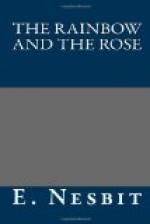“But when true love is shed on want and sin,
Their cry is changed, and grows to such a voice
As clamours sweetly at heaven to be let in—
Such sound as makes the saints in heaven rejoice;
Pure gold of prayer, purged of the vain alloys
Of idleness—that is the sound most dear
Of all the earthly sounds God leans from heaven to
hear.
“Oh, brother, I must leave thee, and for me
The work is heavy, and the burden great.
Thine be this charge I lay upon thee: See
That never again stands barred thy abbey gate;
Look that God’s poor be not left desolate;
Ah me! that chidden my shepherds needs must be
When my poor wandering sheep have so great need of
me.
“Brother, forgive thy Brother if he chide,
Thy Brother loves thee—and has loved—for
see
The nails are in my hands, and in my side
The spear-wound; and the thorns weigh heavily
Upon my brow—brother, I died for thee—
For thee, and for my sheep that are astray,
And rose to live for thee, and them, on Easter Day!”
“My Master and my Lord!” the Abbot cried.
But, where that face had been, shone the new day;
Only on the marble by the Abbot’s side,
Where those dear feet had stood, a lily lay—
A lily white for the white Easter Day.
He sought the gate—no sorrow clamoured
there—
And, not till then, he dared to sink his soul in prayer.
And from that day himself he kept the gate
Wide open; and the poor from far and wide,
The weary, and wicked, and disconsolate,
Came there for succour and were not denied;
The sick were healed, the repentant sanctified;
And from their hearts rises more prayer and praise
Than ever the abbey knew in all its prayer-filled
days.
And there the Heavenly vision comes no more,
Only, each Easter now, a lily sweet
Lies white and dewy on the chancel floor
Where once had stood the beloved wounded feet;
And the old Abbot feels the nearing beat
Of wings that bring him leave at last to go
And meet his Master, where the immortal lilies grow.
Via AMORIS.
I.
It is not Love, this beautiful unrest,
This tremor of longing that invades my breast:
For Love is in his grave this many a year,
He will not rise—I do not wish him here.
It is not memory, for your face and eyes
Are not reflected where that dark pool lies:
It is not hope, for life makes no amends,
And hope and I are long no longer friends:
It is a ghost out of another Spring
It needs but little for its comforting—
That I should hold your hand and see your face
And muse a little in this quiet place,
Where, through the silence, I can hear you sigh
And feel you sadden, O Virgin Mystery,
And know my thought has in your thought begot
Sadness, its child, and that you know it not.




